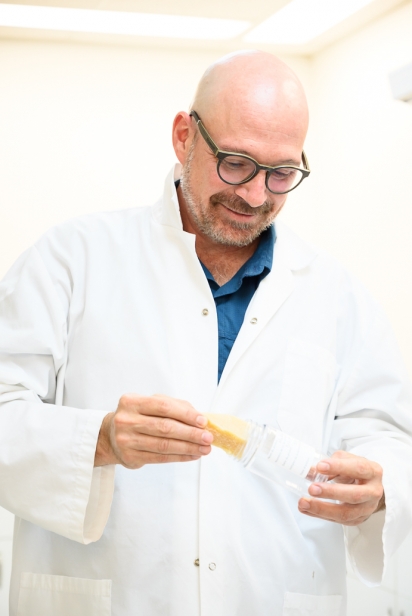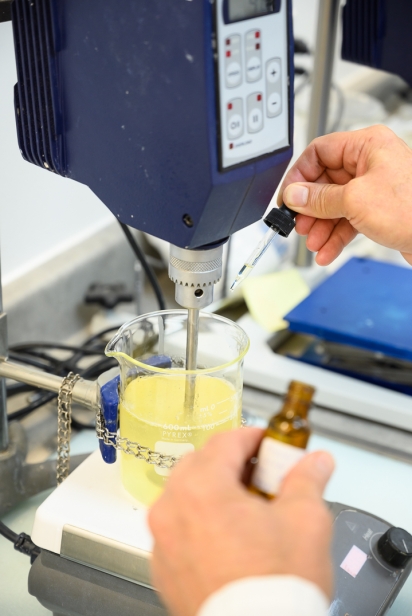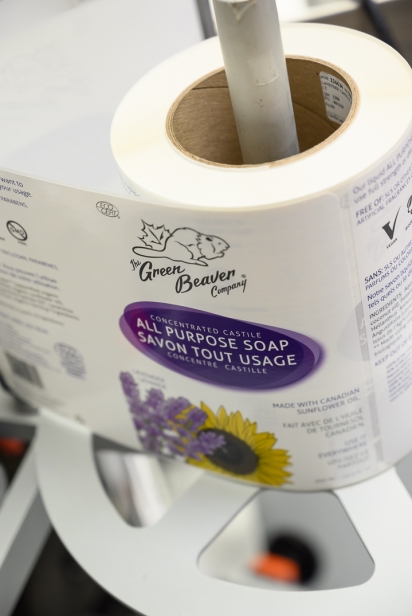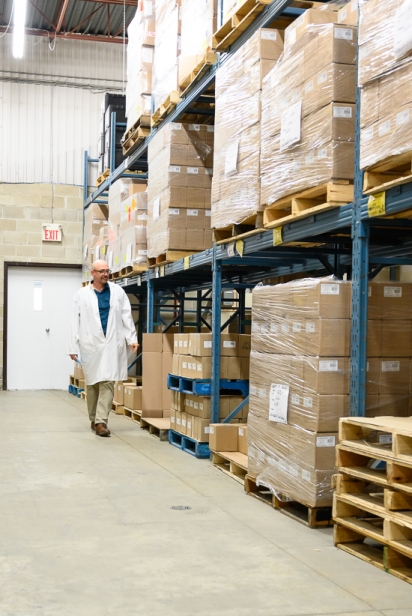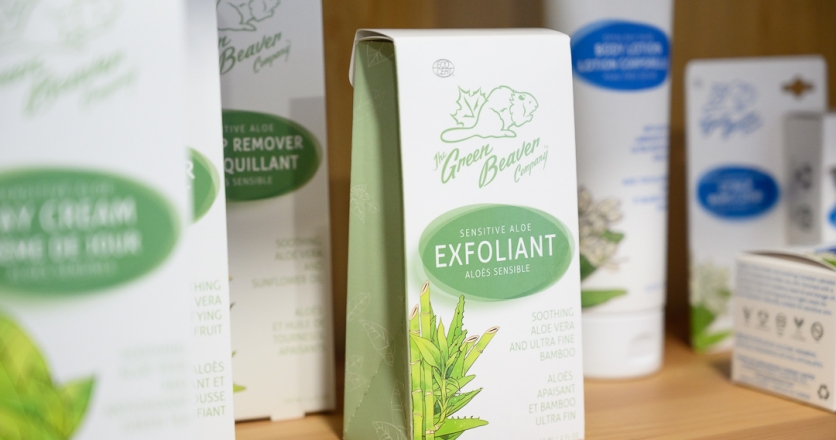A Clean Break
At the beginning of 2020, Alain Ménard had no intention of adding hand sanitizer to the Green Beaver Company’s established line of natural skin care, cosmetics and personal care products. But in mid-March, as Canada went into lockdown mode in response to the COVID-19 pandemic, he recognized an opportunity — and a chance to provide consumers with a better option.
“As Winston Churchill once said, ‘Never waste a good crisis,’” says Ménard, his business acumen showing through his relaxed, personable tone.
Ménard, who co-founded the Green Beaver Company in 2002 alongside his wife, Karen Clark, formulated a hand sanitizer in their Hawkesbury, Ont., lab. The product was launched last April.
“We went with a spray, which I think is more practical,” Ménard says. “You can spray your hands, your phone, your computer, door handles… and I think it’s a nicer feel. I wanted to go with something more versatile; instead of mixing it with artificial fragrances and chemicals, ours is 100-per-cent natural — it contains glycerin and essential oils.”
He goes on to describe what many consumers are now realizing as they head back to in-store shopping: Not all hand sanitizers are created equal. As retailers scramble to establish COVID-19 health and safety protocols, many are asking customers to sanitize before entering the premises. Hand sanitizer varies in both consistency and odour; that’s because some products are made with harsh chemicals, Ménard explains.
“Health Canada temporarily approved the use of technical ethanol,” Ménard says. “That’s actually what they use in gas; it’s not as filtered and it stinks — even fragrances have a hard time masking that smell.”
In fact, Health Canada acknowledged the health risks of many hand sanitizers in August, when it recalled more than 50 products. The organization now has an “evolving list” on its website and advises Canadians to steer clear of flagged products to avoid symptoms such as headaches, eye irritation, skin irritation, and even upper respiratory system irritation. Children’s exposure to the recalled products are of particular concern.
The Green Beaver Company designed a product that’s effective, yet gentle, Ménard says. While the Antiseptic Spray Hand Sanitizer relies on ethanol — which is a plant-based alcohol — it doesn’t contain harsh antiviral agents such as triclosan, which can irritate the skin and be absorbed by the body. Since the alcohol in the hand sanitizer can be very drying, the Green Beaver Company adds glycerin to its product. Lavender, orangeand mint essential oils, the latter sourced from a Quebec-based company called Aliksir, give the product its pleasant scent.
“A lot of customers comment on how much they love the smell of our hand sanitizer; they also find it’s not as tacky or as drying as a gel,” says Ménard, adding the product is now being sold at Loblaws, in addition to health-food stores and online.
A fork in the road
Two decades ago, Ménard was working as a microbiologist in the pharmaceutical industry, and Clark was working as a biochemist in the pesticide industry. As the young couple began to plan for a family, Ménard says his wife wanted to get rid of all the hazardous chemicals in the house.
“The mother instinct kicked in for Karen and she started preparing the nest,” he recalls. “All of a sudden, there was no more Mr. Clean; she had some sort of ying-yang natural floor cleaner… and Mr. Clean never came back.”
Since there weren't many products available at that time, the two trained scientists began tinkering with their own formulas. “We bought some lab equipment: a couple heating plates, mixers, emulsifiers, and, just as a hobby, started making things,” Ménard says. “We were big into cooking, so we thought it would be fun to make our own creams.”
As her passion for natural products grew, Ménard says there came a point when it almost seemed as though his wife was living a double life.
“When you think about it, she was the pesticide queen during the day and Mother Nature in the evening,” he points out. At that time, Clark decided to leave the pesticide industry behind.
About a year later, Ménard’s sister — a mother of three young children — was diagnosed with aggressive breast cancer, and underwent an emergency mastectomy. With no hereditary links, Ménard says he believes that the cancer may have occurred as a result of hazardous chemical exposure.
“When it comes to chemical exposure, you’re getting a little from your floor cleaner, from the fragrance in your Tide, your shampoos and creams that you’re putting on your body, in what you eat,” he says. “Some of us accumulate more than others, and some of us don’t have the same immune system as others.”
A week after the news of his sister’s diagnosis, Ménard quit his job in the pharmaceutical industry and decided to focus on building a business with his wife.
A sustainable clean
Nearly 20 years after launching the Green Beaver Company, the product line has expanded exponentially. From its flagship products — aluminum-free deodorant and toothpaste — the company has added organic, biodegradable hair-care products, facial products, sunscreens and baby care products to its offerings.
Amidst the hand-washing craze of COVID-19, the company’s organic castile soaps have vaulted to the forefront of customer demand.
“It’s funny because hand sanitizer was not part of our R&D plan; it wasn’t even on the map — and now look at today,” Ménard says. “For soap, it made up a pretty small part of our sales and now it’s the biggest category.”
With Spanish roots, castile soap is one of the oldest soap formulations in history.
“It’s a concentrated soap known for its versatility and biodegradability — it’s pure,” Ménard says. “Back in those days, it was the soap they used for everything — and you still can. Everyone who tries using castile soap loves it; you can use it for your floors, your laundry, washing your sink and as a body wash.”
The Green Beaver’s Liquid Castile Soaps are made with coldpressed, Canadian organic sunflower-seed oil, sourced from Maison Orphée in Quebec. To create a generous lather, the product is blended with coconut oil.
“Sunflower oil hardly foams, but it’s just as effective,” explains Ménard, adding that many mainstream personal-care products contain sodium lauryl sulfate to create lather. “We add coconut oil because it provides the foam — that’s a perception that customers have that the product is working.”
Ménard and Clark are passionate about dispelling myths and misinformation about consumer products. As trained scientists, they’re able to take a data-driven approach. “
We wanted to use the products as a means to tell people there are alternatives to what they’ve been accustomed to,” Ménard says. “Being scientific, we always base whatever we say on science.”
As an example, he points to the use of formaldehyde in many everyday products — and the misleading percentages that allow for product approval.
“You might think, ‘Well, nobody uses formaldehyde,’ but actually, I would say the majority of the preservatives in personal care products use slow-release formaldehyde,” says Ménard, adding that three quarters of baby-care products on the market contain formaldehyde slow releasers. “It’s approved as a microbial preservative agent by Health Canada.”
While many products only use a very small amount of formaldehyde, Ménard says the issue is that regulations don’t account for human behaviour.
“Most of us use more than one product,” he says. “Even at 0.1 per cent, what if it’s in two or three products? And in a single product, you may have more than one ingredient that can have the same nasty effect.”
A growing demand
Despite the need for increased consumer awareness, Ménard says he’s encouraged by the gradual shift he has seen towards natural products over the past two decades.
“Back then, if I was trying to convince a mom with young kids to use natural products, she was skeptical,” he says. “And now, if I talk to mothers, they are trying to sell me on natural. The market has always grown, but now it’s really taking off.”
In addition to the Canadian market, the Green Beaver Company is now poised to sell products through Tmall, a Chinese-language website for business-to-consumer online retail.
“It’s the Amazon of China,” explains Ménard, adding that there’s a huge demand for baby care products in particular. “Canada is really well positioned; it’s perceived as being clean and pure, and having good regulations.”
Here in Canada, Ménard hopes that as consumers open their wallets, they’ll consider supporting home-grown companies.
“In terms of sustainability, think about where it’s coming from; do you really need to buy something from overseas when the same product is made here in Canada?” he asks. “Especially now that a lot of people have lost jobs… the more we buy Canadian products, the more jobs we can create — that’s an important factor. “We make great products in Canada; our standards are high; to me it’s a no-brainer to buy Canadian.”
Ultimately, Ménard challenges consumers to demand high-quality products — for the sake of our bodies and the environment.
“Make sure it’s a product that works,” he says. “But also think about our planet: If everyone uses chemical soaps, artificial fragrances and anti-bacterials, where does it end up? In Ottawa, it’s the Ottawa River; in Montreal, it’s the St. Lawrence River; in Toronto, it’s Lake Ontario. Just imagine all the chemicals flowing into our rivers. They don’t biodegrade overnight, it takes years."
“There’s always the chance to change our habits for the better.”
The Green Beaver Company
760 Tupper St., Hawkesbury, Ont.
greenbeaver.ca | 613.632.1899 | @the_green-beaver



